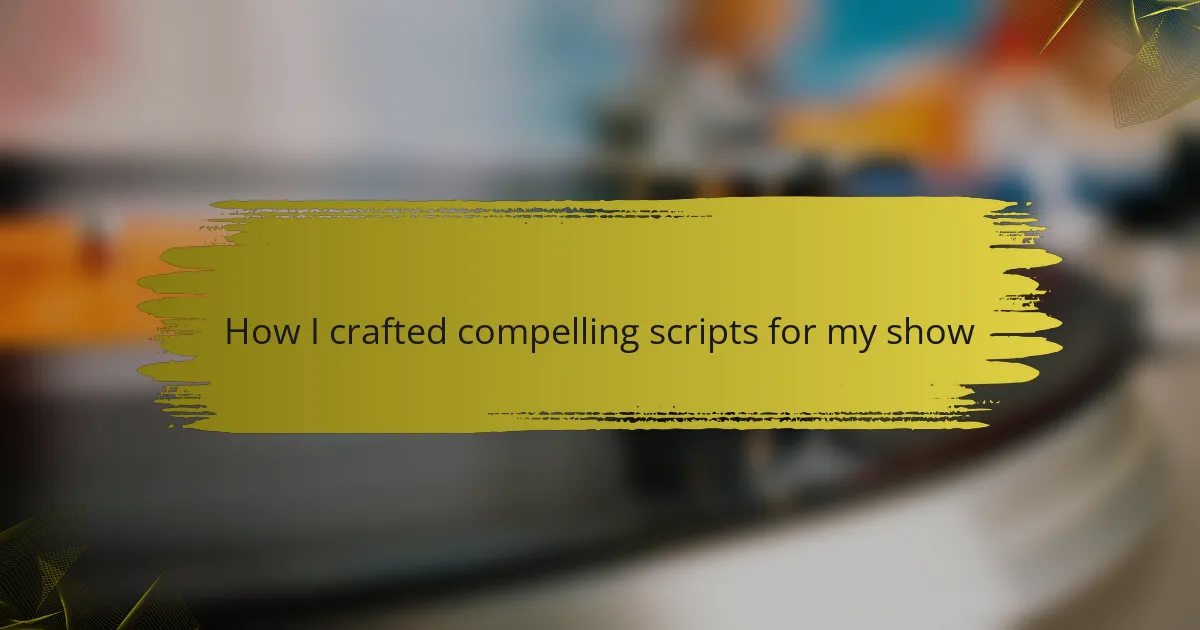Key takeaways
- Independent radio fosters creativity and community engagement, allowing hosts to explore personal and unconventional topics.
- Compelling scripts are essential for engaging listeners, evoking emotions, and allowing room for improvisation.
- Effective storytelling involves clarity, pacing, and relatable narratives that resonate with audiences.
- Revising scripts based on feedback and personal insights is crucial for enhancing content authenticity and connection.
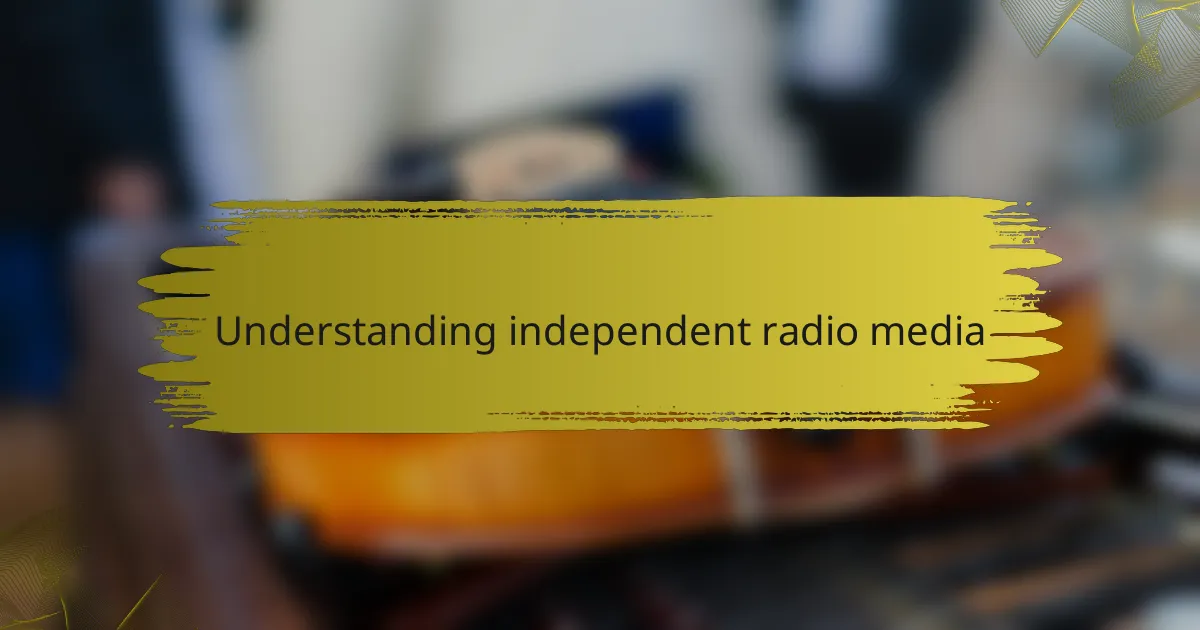
Understanding independent radio media
Understanding independent radio media is a fascinating journey for anyone interested in storytelling and community connection. From my experience, it serves as a vibrant platform where authenticity and creativity flourish. Unlike commercial radio, independent media often emphasizes diverse voices and unique perspectives, which keeps the content fresh and relatable.
When I first dived into this realm, I felt a rush of excitement knowing I could create content that truly resonated with my audience. There’s something special about being part of a community that values genuine interaction over profit margins. This freedom allows hosts to explore unconventional topics, share personal stories, and connect with listeners on a profound level.
Here’s a comparison table to help illustrate some key differences between independent radio media and commercial radio:
| Aspect | Independent Radio Media | Commercial Radio |
|---|---|---|
| Content Freedom | High – hosts create unique and personal content | Limited – follows advertising and ratings pressure |
| Audience Engagement | Strong – fosters community connections and feedback | Moderate – often one-way communication |
| Funding Sources | Grants, donations, and listener support | Advertising revenue and sponsorships |
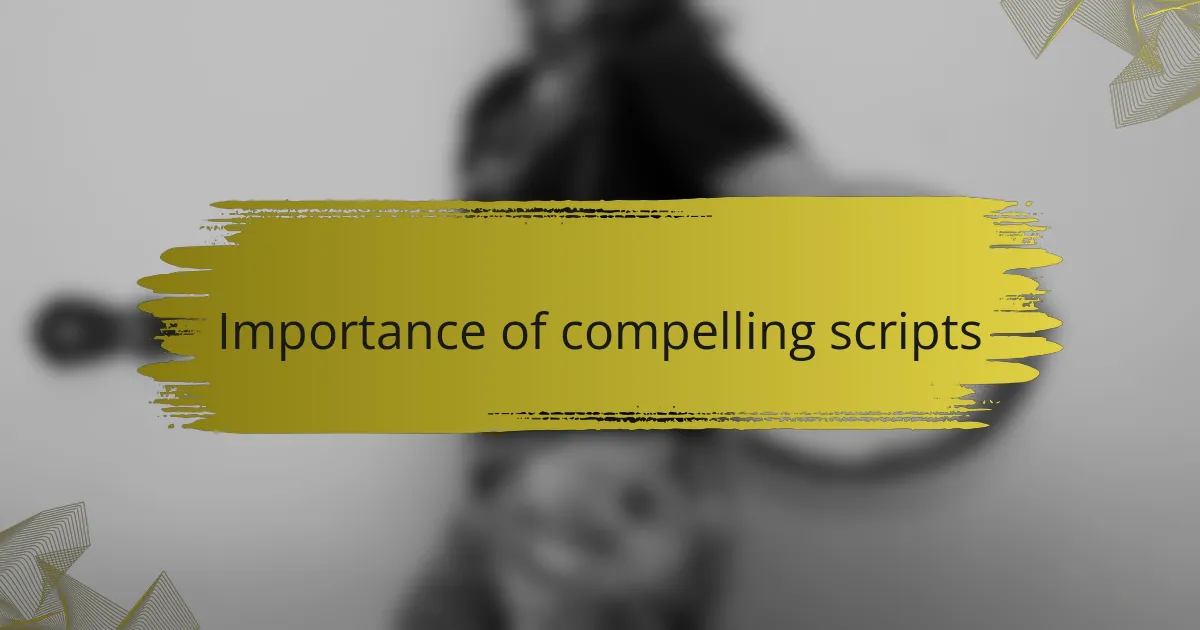
Importance of compelling scripts
Compelling scripts are the heartbeat of any radio show. They guide the flow of conversation, keeping listeners engaged and invested in the storyline. I remember the first time I crafted a truly captivating script; it felt like unlocking a new level of connection with my audience.
When I think about my own experiences, it becomes clear that good scripts do more than just outline what to say. They evoke emotions, create relatable moments, and draw listeners into the narrative. This emotional engagement is critical in a world where attention spans are short, and listeners are bombarded with options.
The script also serves as a framework for spontaneity. I’ve found that allowing room for improvisation within a well-structured script can bring out authenticity and excitement, making the content feel fresh and alive. In essence, a compelling script not only informs but also inspires.
| Compelling Scripts | Average Scripts |
|---|---|
| Evokes strong emotions | Often flat and generic |
| Engages listeners | May lose audience interest |
| Allows for improvisation | Restrictive and rigid |
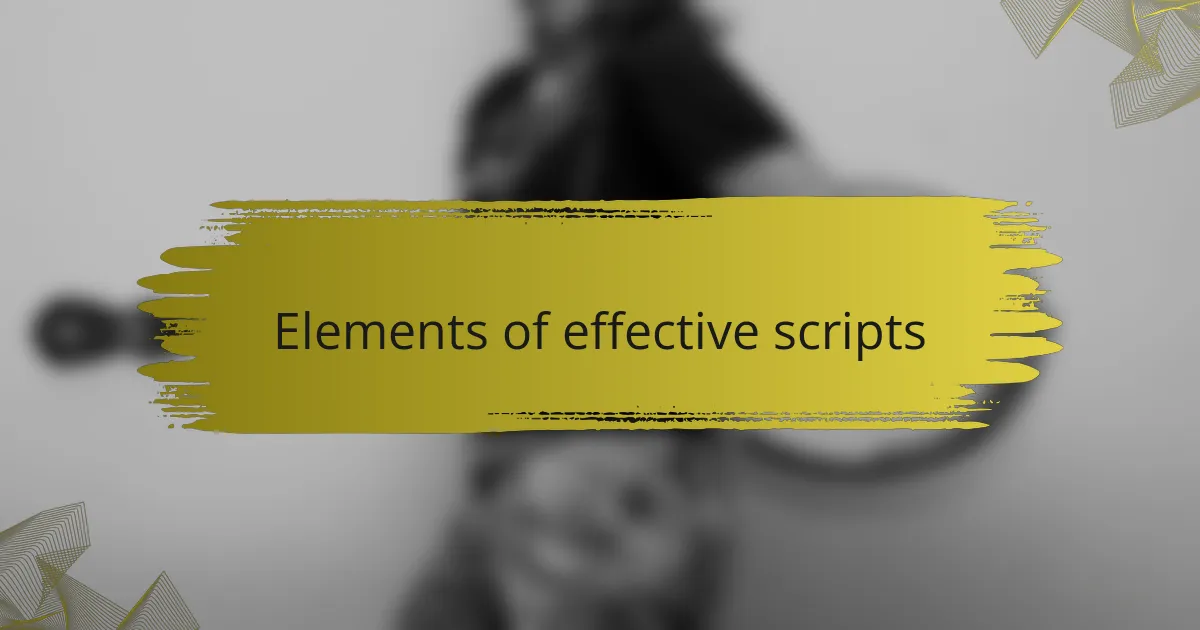
Elements of effective scripts
Creating effective scripts for radio shows hinges on a few key elements. One vital aspect is storytelling. I’ve learned that weaving a compelling narrative can captivate listeners’ imaginations, making them feel like they are part of the experience. Think about the last time a story pulled you in—didn’t you feel a connection? That’s the magic of a well-crafted story.
Another critical element is clarity. It’s essential for the ideas presented to be easily understandable. There’s nothing more frustrating than listening to a confusing segment. I remember a time when I tried to be too clever with my language, and I lost my audience halfway through. Keeping my language accessible ensures that listeners stay engaged right to the end.
Lastly, pacing plays a significant role in crafting effective scripts. I’ve discovered that varying my pace can create anticipation and excitement. For instance, slowing down during a crucial point can emphasize its importance, while a faster tempo can inject energy into discussions. This balance keeps the flow dynamic and enhances listener engagement—something I always strive for in my shows.

Researching your show topic
When I sit down to research the topic for my show, I often start with what excites me personally. I ask myself questions like, “What am I curious about right now?” or “What stories do I want to uncover?” This initial spark helps me focus my research on areas that not only captivate me but are also likely to engage my audience. I’ve found that when I’m genuinely interested in a subject, it translates into more compelling content.
Diving deeper, I turn to various sources for information—I always prioritize credible ones. Whether it’s academic articles, interviews with experts, or even relevant podcasts, I make it a point to gather a diverse array of insights. One time, while researching community gardens for a show, I stumbled upon an inspiring interview with a local gardener. She shared stories of transformation that added richness to my script and made the topic come alive. How often do you get a chance to explore a subject in such depth?
I also believe in the power of listening. Engaging with my potential listeners through social media or community forums provides invaluable information about what resonates with them. Gathering feedback and ideas has helped me tailor my scripts more effectively. One memorable instance was when I received a suggestion from a listener to explore local historical landmarks. That simple nudge led me to create an episode that not only honored the past but also sparked a sense of pride in our community. Isn’t it incredible how a little research can truly connect us with those we hope to reach?
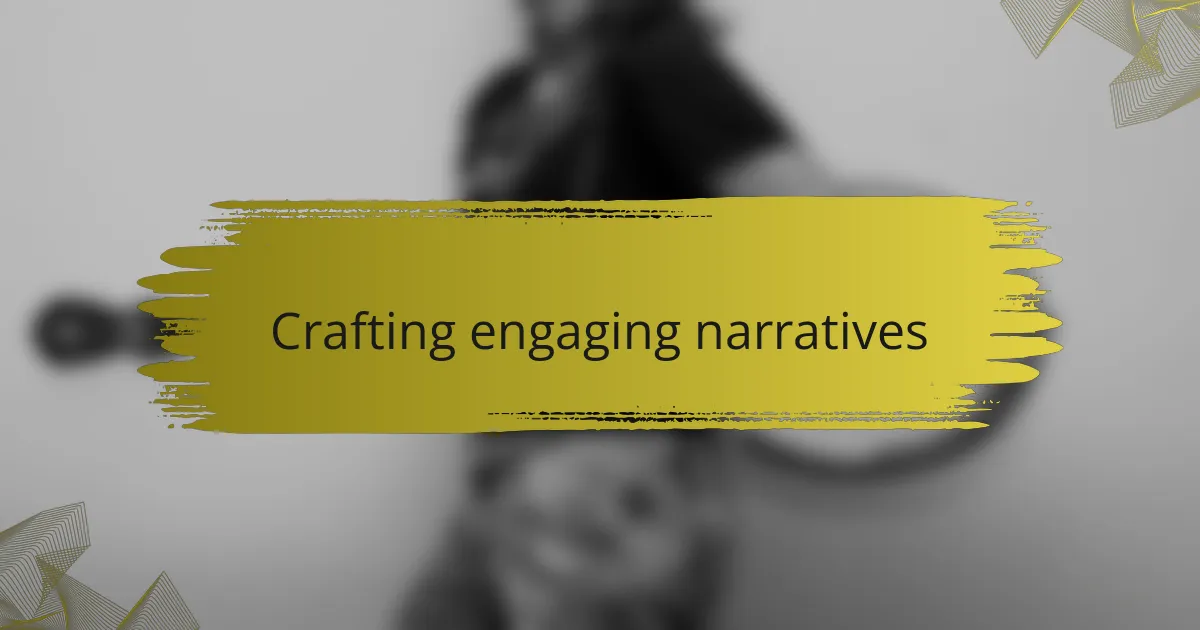
Crafting engaging narratives
Crafting engaging narratives is truly at the heart of creating compelling scripts. I remember when I first started, I often felt overwhelmed by the sheer volume of ideas swirling in my head. It was through personal stories that I learned to connect deeply with my audience. I would share my own experiences, allowing listeners to find familiar emotions and situations they could relate to, making each episode feel like a conversation with a friend.
To enhance your storytelling, consider these techniques:
- Use vivid imagery: Paint a picture with words to captivate your audience.
- Incorporate personal anecdotes: Sharing your own experiences can create a strong connection.
- Establish a clear structure: A beginning, middle, and end will guide listeners through your narrative.
- Build tension: Engage your audience by creating suspense or conflict that needs resolution.
- Be authentic: Your genuine voice will resonate more with your listeners than any scripted perfection.
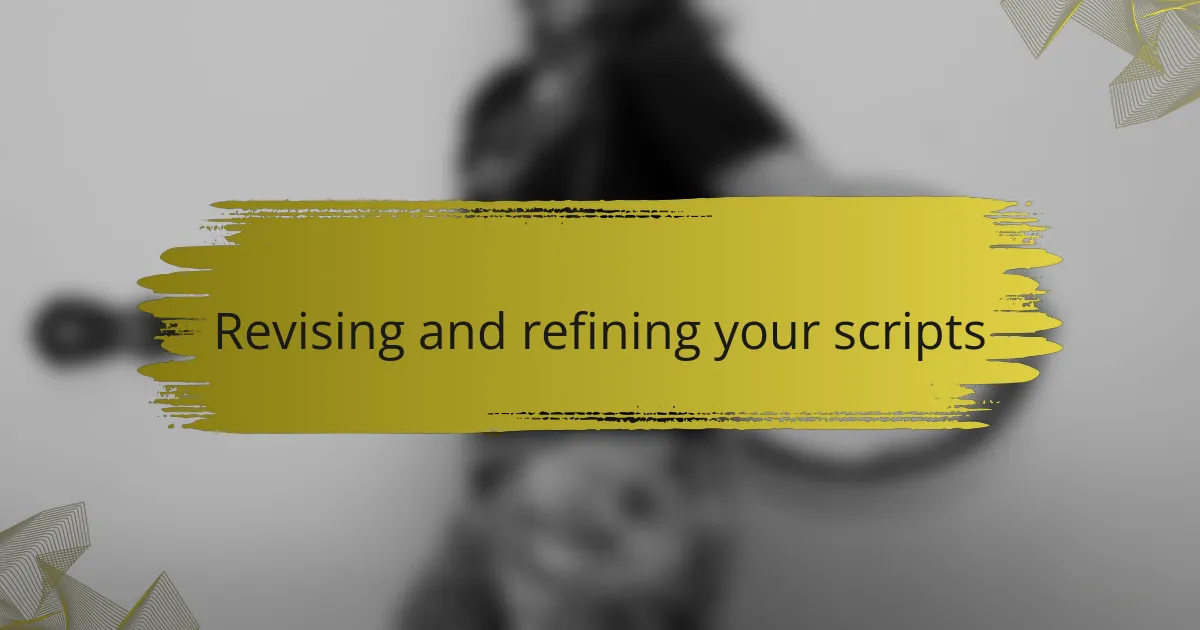
Revising and refining your scripts
Revising and refining scripts is a crucial step in my creative process. I often find that my first drafts are just the starting point; it’s through revision that I truly hone my ideas. For example, during my last show, I had a segment that felt disconnected. After revisiting it, I added relatable anecdotes from my own life, which made the content resonate so much more with my audience.
I also think it’s essential to get feedback. I usually share my scripts with trusted peers, and their insights can open my eyes to aspects I might have overlooked. I’ve found that even simple suggestions can dramatically enhance the clarity and flow of my scripts, turning a mediocre segment into something memorable.
Here’s a comparison table that outlines common script elements before and after revision:
| Original Element | Revised Element |
|---|---|
| General statements | Engaging anecdotes |
| Complex explanations | Clear, concise descriptions |
| Rigid structure | Flexible flow tailored to audience |
| Lack of emotional connection | Relatable personal experiences |
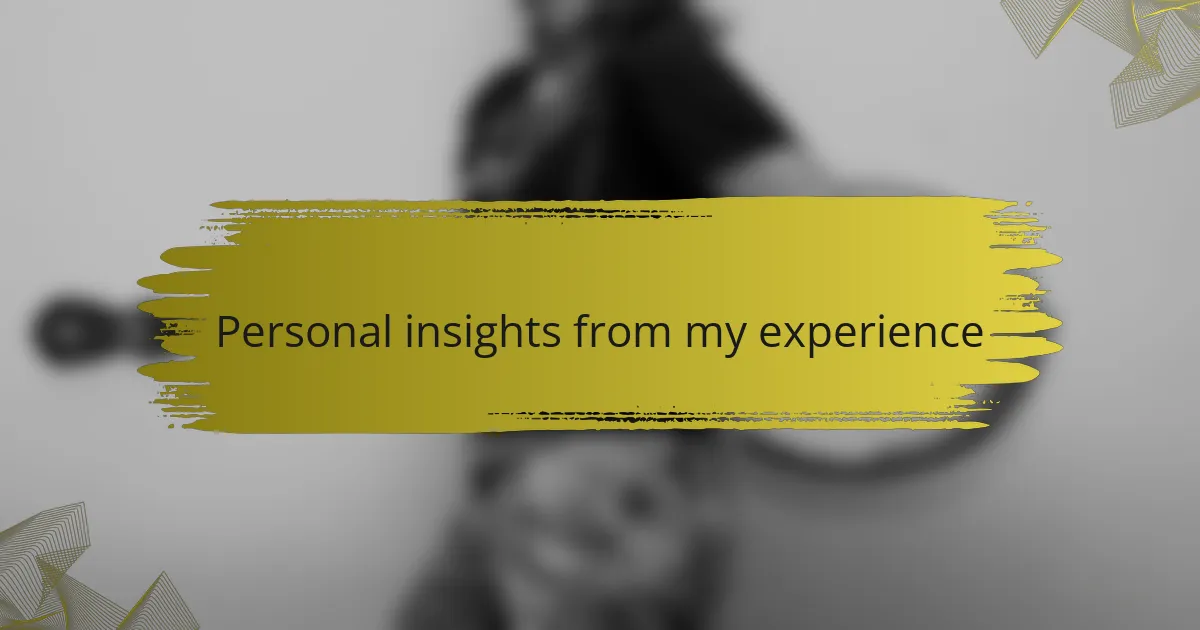
Personal insights from my experience
When I reflect on my journey in scriptwriting, I realize that the heart of the process is connecting with my authentic self. Early on, I would sometimes write what I thought listeners wanted to hear instead of what truly inspired me. After a few shows, I learned that when I shared my genuine experiences and emotions, the connection with my audience deepened significantly. Have you ever felt that moment when your words resonate so deeply with others? It’s a powerful experience that drives me to write more authentically.
Another insight I gathered is the value of revisiting my own recordings. Listening to past shows often reveals patterns I didn’t notice while in the moment. There was a particular episode where I aimed for humor, but instead, it felt forced. This prompted me to rethink my approach; humor should feel natural and emerge spontaneously. My takeaway? Sometimes, we have to listen to ourselves as critically as we assess others. Have you ever listened back to something you created and cringed at what you heard? It’s a humbling experience, but it’s essential for growth.
Finally, I can’t stress enough how valuable listener feedback has been for my script refinement. One time, a listener mentioned how a simple phrase I used inspired them during a tough time. That moment made me realize the profound impact our words can have. It also motivated me to pay closer attention to the emotions I evoke through my scripts. What if we all took more time to consider the weight of our words? This thought drives me to craft scripts that not only inform but also uplift and connect.
